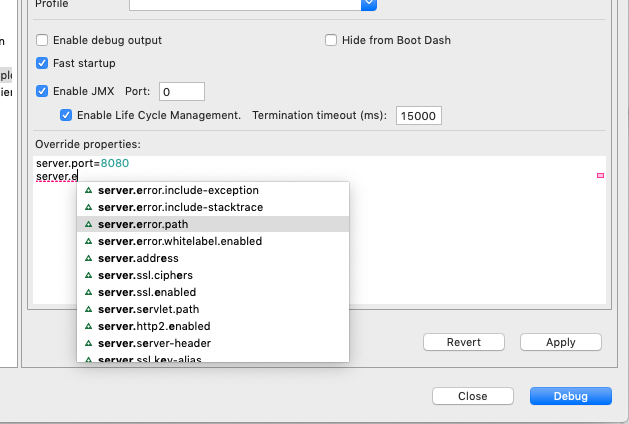Spring Tool Suite 3.9.7: New and Noteworthy
Updates and New/Enhanced Features
Eclipse 2018-12 (4.10)
The default STS distribution is now based on the recently released Eclipse 2018-12 (4.10) release, including support for Java 11. Details about the Eclipse release can be found here: Eclipse 2018-12.
Boot launch configs now feature full properties editing support
The launch configurations for Spring Boot applications allow you to add custom Spring Boot properties for each launch configuration. This was done using a table with cell editors in the past, including content-assist for the property keys. This got replaced with a full-blown embedded properties editor in the latest version of STS, which is a lot easier to use. It includes content-assist, marks errors and warnings, and provides hover help for all your property keys.

Important Changes and Fixes
- improvement: added support for BuildShip 3
- improvement: CF manifest editing now supports new attribute "buildpacks"
- fixed: improved error handing when creating browser control for Spring dashboard view
- fixed: improved compatibility check for Java versions on Maven build errors
- fixed: MissingConfigurationProcessorRule produces a false positive when developing Spring Boot (#329)
Issues now tracked on GitHub Issues
Issues around the Spring Tool Suite and the Spring IDE are tracked on GitHub from now on: https://github.com/spring-projects/spring-ide/issues.
Thanks for using the automatic error reporting
We would also like to thank our users for using the automated error reporting that we included since the 3.8.2 release and for sending us all those error reports. We used them to fix issues and improve reliability in this release. And we will continue to do that. So please keep those error reports coming!
In case you see a notification showing up that our error report quota exceeded, don't be surprised. With support from
CodeTrails, we use a limited plan for this error reporting facility - and that might cause our quota to exceed
from time to time. If you want to switch off those notifications, please go to the Preferences -> General ->
Notifications.
Manual Maven support going to be removed soon
We plan to remove the support for manual Maven projects from STS and Spring IDE in future versions of STS and Spring IDE. The manual maven support was used in the past when projects used Maven, but didn't opt-in to use the direct Maven support in Eclipse via the m2e project. While projects can still decide to not use m2e for their projects, the support for that via additional menu actions in STS will be gone.
Useful Links
Download STS: https://spring.io/tools3/sts/all
Spring Tools Issue tracker: https://github.com/spring-projects/spring-ide/issues
Known issues in this release
Deploying apps to Cloud Foundry via Boot Dashboard does not support new buildpacks attribute yet
The new buildpacks attribute in manifest.yml files is not yet supported when deploying apps via the Spring Boot dashboard within STS. A dialog will pop up and warn you about this limitation in case you run into this situation. As a workaround, you can push your apps via the CF CLI or continue to use the deprecated buildpack attribute.
Deleting Eureka service instances from Boot Dashboard
Deleting certain Eureka service instances, like p-service-registry in Pivotal Web Services, from boot dashboard Cloud Foundry targets may experience problems with timeouts. The same issue may be found when deleting them from Eclipse Tools for Cloud Foundry (CFT). A workaround is to use the cf CLI to delete these service instances.
Running on JDK9/JDK10/JDK11
STS 3.9.7 can run on top of a JDK out-of-the-box. However, please notice that the Maven support in Eclipse/STS runs within the JVM of the IDE and therefore also uses the JDK9/10 runtime. While that isn't necessarily a problem, having Maven modules in your build that aren't compatible with Java 9 might cause your project build to fail in Eclipse/STS.
This is the case, for example, if you use Spring Boot 1.5.x or earlier versions, which uses an older version of the Maven jar plugin, which fails when running on top of a Java 9/10/11 VM. In that case we recommend to configure Eclipse/STS to run on top of a Java 8 runtime (by modifying the eclipse.ini or sts.ini file accordingyly).
Spring Boot dashboard ngrok tunneling feature doesn't support Spring Cloud Services yet
The Spring Boot Dashboards ngrok tunnel feature doesn't work yet with remote service registries from Spring Cloud Services. Instead it works with self-deployed Eureka service registry apps on CF only (as described here). We are working on enhancing the ngrok tunnel feature to directly support Spring Cloud Services in the near future. In the meantime we published a tech note that describes how to setup ngrok tunneling in combination with SCS manually.
Boot App launched with Thin Jar Launcher hangs during start up
Workaround is open launch configuration for the Boot App. Navigate to Spring Boot tab and enter a boot property into "Override Properties" table. For example server.port and value 8080. Save the launch configuration and re-launch your Boot App.
Silent loss of Functionality on Java 7 or earlier
STS 3.9.7 requires a JDK8/9/10 to run on top of. If you are running it with an older JDK this may not be immediatlely apparant, but some of STS functionality will simply be 'absent' because the corresponding plugins are automatically disabled by OSGI because their requirements are not satisfied at runtime. See also below 'Setting the JDK'.
Setting the JDK
STS 3.9.7 requires a JDK8/9/10/11 to run on top of. Nevertheless the native Eclipse launcher component might pick up a JRE or an older JDK automatically if you don't specify which JDK to run STS on top of. To avoid this, you can specify the JDK in the sts.ini file that comes with your STS installation. Add a line at the beginning "-vm" and an additional line below that which points to the "javaw" executable of the JDK on your machine. Here is a detailed explanation how to configure the JVM in the ini file.